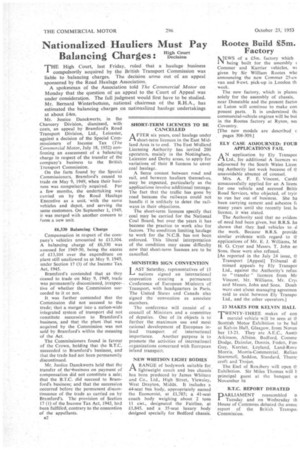Nationalized Hauliers Must Pay Balancing Charges : Ha li cl o o u n r t T HE
Page 36

If you've noticed an error in this article please click here to report it so we can fix it.
1-figh Court, last Friday, ruled that a haulage business compulsorily acquired by the British Transport Commission was liable to balancing charges. The decision arose out of an appeal sponsored by the Road Haulage Association. A spokesman of the Association told The Commercial Motor on
Monday that the question of an appeal to the Court of Appeal was under consideration. The full judgment would first have to be studied. Mr. Bernard Winterbottom, national chairman of the R.H.A., has estimated the balancing charges on nationalized haulage undertakings at about £.41m.
Mr. Justice Danckwertse in the Chancery Division, dismissed, with costs, an appeal by Bramford's Road Transport Division, Ltd., Leicester, against a decision of the Special Commissioners of Income Tax (The Commercial Motor, July 18, 1952) confirming an assessment of a balancing charge in respect of the transfer of the company's business to the British Transport Commission.
On the facts found by the Special Commissioners, Bramford's ceased to trade on May 9, 1949, when their busi
ness was compulsorily acquired. For a few months, the undertaking was carried on by the Road Haulage Executive as a unit, with the same vehicles and depot, and serving the same customers. On September 1, 1949, it was merged with another concern to form a new unit.
£6,330 Balancing Charge Compensation in respect of the company's vehicles amounted to £13,104. A balaecing charge of £6,330 was assessed for 1949-50, being the ekcess of £13,104 over the expenditure on plant still unallowed as at May 9, 1949, under Section 17 (3) of the Income Tax Act, 1945.
Bramford's contended that as they ceased to trade on May 9, 1949, trade was permanently discontinued, irrespective of whether the Commission succeeded to it or not.
It was further contended that the Commission .did not succeed to the trade; that a merger into a nation-wide integrated system of transport did not constitute succession to Bramford's business, and that the plant that was acquired by the Commission was not sold by Bramford's within the meaning of the Act.
The Commissioners found in favour of the Crown, holding that the B.T.C. succeeded to Bramford's business, and that the trade had not been permanently discontinued.
Mr. Justice Danckwerts held that the transfer of the*usiness on payment of compensation did not constitute a sale; that the B.T.C. did succeed to Bramford's business; and that the succession occurred before the permanent discontinuance of the trade as carried on by Bramford's. The provision of Section 17 (1) of the Income Tax Act, 1945, had been fulfilled, contrary to the contention of the appellants.




































































































